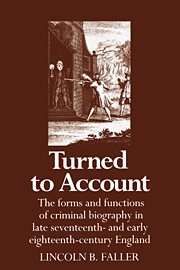 Turned to Account
Turned to Account Book contents
- Frontmatter
- Contents
- Preface
- Part I Turning criminals to account: three case histories and two myths of crime
- Part II Enucleating the truth: the criminal as sinner turned saint
- Part III Palliating his crimes: the thief as various rogues
- 6 Smiles, serious thoughts, and things beyond imagining: a provisional typology of thieves in action
- 7 Barbarous levities: fear, guilt, and the value of confusion
- 8 Everyone left to his own reflections: the oddity of the highwayman as hero and social critic
- Postscript: Criminal biography and the novel
- Appendix I Who read the popular literature of crime?
- Appendix II The politics of thieving
- Notes
- Select bibliography
- Index
7 - Barbarous levities: fear, guilt, and the value of confusion
Published online by Cambridge University Press: 05 February 2012
- Frontmatter
- Contents
- Preface
- Part I Turning criminals to account: three case histories and two myths of crime
- Part II Enucleating the truth: the criminal as sinner turned saint
- Part III Palliating his crimes: the thief as various rogues
- 6 Smiles, serious thoughts, and things beyond imagining: a provisional typology of thieves in action
- 7 Barbarous levities: fear, guilt, and the value of confusion
- 8 Everyone left to his own reflections: the oddity of the highwayman as hero and social critic
- Postscript: Criminal biography and the novel
- Appendix I Who read the popular literature of crime?
- Appendix II The politics of thieving
- Notes
- Select bibliography
- Index
Summary
It is not the smallest among those Sufferings which Men under Sentence of the Law endure, that a censorious World are continually propagating evil Reports, and spreading from one to another Rumors without Foundation. The Miseries which real Breaches of the Laws draw on unhappy Criminals are heavy enough in themselves to excite Compassion, and it is either Cruelty of Disposition, or a Barbarous Levity of Mind from whence Men are led to scatter such Detractions … turning their Conjectures into formal Stories, merely to blacken one already overthrown.
William Gordon, a condemned highwayman hanged in 1733, quoted in Select Trials (1742), 4:61–62And, indeed, if Shepherd had been as wretched, and as silly a Rogue in the World as upon the Stage, the lower Gentry, who attended him to Tyburn, wou'd never have pittied him when he was hang'd.
From a review of Harlequin Shepherd in Mist's Weekly fournal, 5 December 1724What a lamentable case it is to see so many Christian men and women strangled on that cursed tree of the gallows, insomuch as if in a large field a man might see together all the Christians, that but in one year, throughout England, come to the untimely and ignominious death, if there were any spark of grace, or charity in him, it would make his heart to bleed for pity and compassion.
Sir Edward Coke, Epilogue to The Third Part of the Institutes (1644)How shocking soever this Consideration may be, it must be owed, that these Terrors and these Punishments are … absolutely necessary for the Preservation of Order and Government.
Herbert Randolph, Assize Sermon, 12 March 1729, p. 2 […]- Type
- Chapter
- Information
- Turned to AccountThe Forms and Functions of Criminal Biography in Late Seventeenth- and Early Eighteenth-Century England, pp. 149 - 173Publisher: Cambridge University PressPrint publication year: 1987
